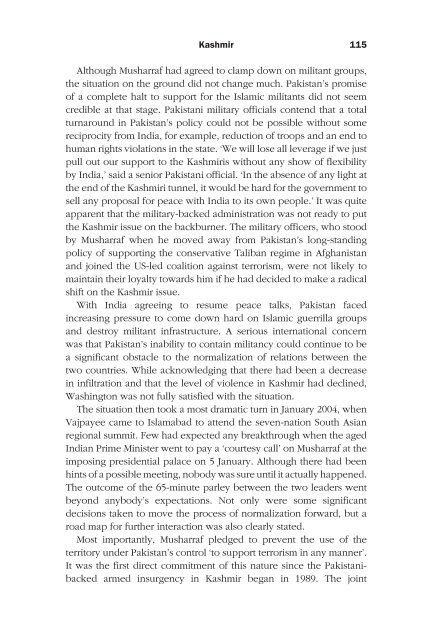Frontline Pakistan : The Struggle With Militant Islam - Arz-e-Pak
Frontline Pakistan : The Struggle With Militant Islam - Arz-e-Pak
Frontline Pakistan : The Struggle With Militant Islam - Arz-e-Pak
You also want an ePaper? Increase the reach of your titles
YUMPU automatically turns print PDFs into web optimized ePapers that Google loves.
Kashmir<br />
11<br />
Although Musharraf had agreed to clamp down on militant groups,<br />
the situation on the ground did not change much. <strong><strong>Pak</strong>istan</strong>’s promise<br />
of a complete halt to support for the <strong>Islam</strong>ic militants did not seem<br />
credible at that stage. <strong><strong>Pak</strong>istan</strong>i military officials contend that a total<br />
turnaround in <strong><strong>Pak</strong>istan</strong>’s policy could not be possible without some<br />
reciprocity from India, for example, reduction of troops and an end to<br />
human rights violations in the state. ‘We will lose all leverage if we just<br />
pull out our support to the Kashmiris without any show of flexibility<br />
by India,’ said a senior <strong><strong>Pak</strong>istan</strong>i official. ‘In the absence of any light at<br />
the end of the Kashmiri tunnel, it would be hard for the government to<br />
sell any proposal for peace with India to its own people.’ It was quite<br />
apparent that the military-backed administration was not ready to put<br />
the Kashmir issue on the backburner. <strong>The</strong> military officers, who stood<br />
by Musharraf when he moved away from <strong><strong>Pak</strong>istan</strong>’s long-standing<br />
policy of supporting the conservative Taliban regime in Afghanistan<br />
and joined the US-led coalition against terrorism, were not likely to<br />
maintain their loyalty towards him if he had decided to make a radical<br />
shift on the Kashmir issue.<br />
<strong>With</strong> India agreeing to resume peace talks, <strong><strong>Pak</strong>istan</strong> faced<br />
increasing pressure to come down hard on <strong>Islam</strong>ic guerrilla groups<br />
and destroy militant infrastructure. A serious international concern<br />
was that <strong><strong>Pak</strong>istan</strong>’s inability to contain militancy could continue to be<br />
a significant obstacle to the normalization of relations between the<br />
two countries. While acknowledging that there had been a decrease<br />
in infiltration and that the level of violence in Kashmir had declined,<br />
Washington was not fully satisfied with the situation.<br />
<strong>The</strong> situation then took a most dramatic turn in January 2004, when<br />
Vajpayee came to <strong>Islam</strong>abad to attend the seven-nation South Asian<br />
regional summit. Few had expected any breakthrough when the aged<br />
Indian Prime Minister went to pay a ‘courtesy call’ on Musharraf at the<br />
imposing presidential palace on 5 January. Although there had been<br />
hints of a possible meeting, nobody was sure until it actually happened.<br />
<strong>The</strong> outcome of the 65-minute parley between the two leaders went<br />
beyond anybody’s expectations. Not only were some significant<br />
decisions taken to move the process of normalization forward, but a<br />
road map for further interaction was also clearly stated.<br />
Most importantly, Musharraf pledged to prevent the use of the<br />
territory under <strong><strong>Pak</strong>istan</strong>’s control ‘to support terrorism in any manner’.<br />
It was the first direct commitment of this nature since the <strong><strong>Pak</strong>istan</strong>ibacked<br />
armed insurgency in Kashmir began in 1989. <strong>The</strong> joint













